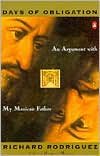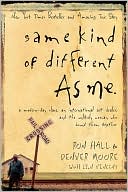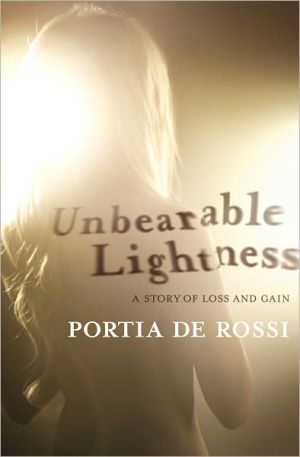Days of Obligation: An Argument with My Mexican Father
Rodriguez's acclaimed first book, Hunger of Memory raised a fierce controversy with its views on bilingualism and alternative action. Now, in a series of intelligent and candid essays, Rodriguez ranges over five centuries to consider the moral and spiritual landscapes of Mexico and the US and their impact on his soul.\ \ \ Rodriguez's acclaimed first book, Hunger of Memory raised a fierce controversy with its views on bilingualism and alternative action. Now, in a...
Search in google:
When I was fourteen and my father was fifty, we toyed with the argument that had once torn Europe, South from North, Catholic from Protestant, as we polished the blue DeSoto. "Life is harder than you think, boy." "You're thinking of Mexico Papa." "You'll see." A fragment of dialogue can summarize the "argument" of Richard Rodriguez's new book, though the book contains five centuries, beginning with the conquest of Mexico by Hernan Cortes; ending in 1992, in San Francisco - an American Asian city, during the years of plague. In Days of Obligation, Mexico and the United States are portrayed as moral rivals upon the landscape of Mr. Rodriguez's beloved California. Mexico wears the mask of tragedy, the United States wears the mask of comedy. By the end of the book the reader recognizes an historical irony: The United States is becoming a culture of tragedy; Mexico, meanwhile, revels in youthful optimism. Mexico and the United States have exchanged roles. These ferocious essays cannot be dismissed as regional. They are not - or only insofar as Montaigne's essays can be said to be regional. The play of idea and incident, the scope of these essays - both public and private - make up a kind of spiritual autobiography with no antecedent in American letters. One must summon the names of writers from the eighteenth and nineteenth centuries in order to describe the literary and moral fabric of the book at hand. Imagine Jonathan Swift sitting in a nightclub in Mexico City. Or imagine Thomas Carlyle writing about homosexuality and domestic architecture. Richard Rodriguez takes his title from the Roman Catholic liturgical calendar. "Days of obligation" are feast days of such importance to the life of the church that the faithful are required to attend them physically by going to mass. Just so does memory require of the author that he attend to particular days of his life to recognize in them moments of mystery and of grace. Publishers Weekly An explorer of cultural identity, Rodriguez builds on his acclaimed memoir Hunger of Memory with 10 luminous, loosely linked essays on the tensions and cross-pollinations of race, religion and geography in Californians of Mexican descent. For Rodriguez, a middle-age Californian of Mexican heritage and of self-described Indian mien, Mexico City's miscegenation makes it the capital of modernity. America's immigrant culture implies not motherhood but adoption, and the growth of evangelical Protestantism among California's Hispanic population suggests a longing for some lost Catholic village. No apostle of political correctness, Rodriguez muses on his state's heritage and concludes, We are all bandits, for the U.S. stole California from Mexico, which stole the land from Spain, which stole it from the Indians. Rodriguez's autobiographical style sometimes reveals too little, as in an essay on gay life in San Francisco, but his insights, irony and descriptions (Tijuana is Disney Calcutta) make the writing richly evocative. However, the book would have gained power had Rodriguez tried harder to thread the essays into a sustained narrative. (Nov.)
Days of Obligation Introduction: My Parent's Village\ Chapter One: India\ Chapter Two: Late Victorians\ Chapter Three: Mexico's Children\ Chapter Four: In Athens Once\ Chapter Five: The Missions\ Chapter Six: The Head of Joaquin Murrieta\ Chapter Seven: Sand\ Chapter Eight: Asians\ Chapter Nine: The Latin American Novel\ Chapter Ten: Nothing Lasts a Hundred Years
\ Publishers Weekly - Publisher's Weekly\ An explorer of cultural identity, Rodriguez builds on his acclaimed memoir Hunger of Memory with 10 luminous, loosely linked essays on the tensions and cross-pollinations of race, religion and geography in Californians of Mexican descent. For Rodriguez, a middle-age Californian of Mexican heritage and of self-described Indian mien, Mexico City's miscegenation makes it the capital of modernity. America's immigrant culture implies not motherhood but adoption, and the growth of evangelical Protestantism among California's Hispanic population suggests a longing for some lost Catholic village. No apostle of political correctness, Rodriguez muses on his state's heritage and concludes, We are all bandits, for the U.S. stole California from Mexico, which stole the land from Spain, which stole it from the Indians. Rodriguez's autobiographical style sometimes reveals too little, as in an essay on gay life in San Francisco, but his insights, irony and descriptions Tijuana is Disney Calcutta make the writing richly evocative. However, the book would have gained power had Rodriguez tried harder to thread the essays into a sustained narrative. Nov.\ \ \ \ \ Dana GioiaThe book that explained my Mexican mother and grandfather to me.\ —The Hungry Mind Review\ \








